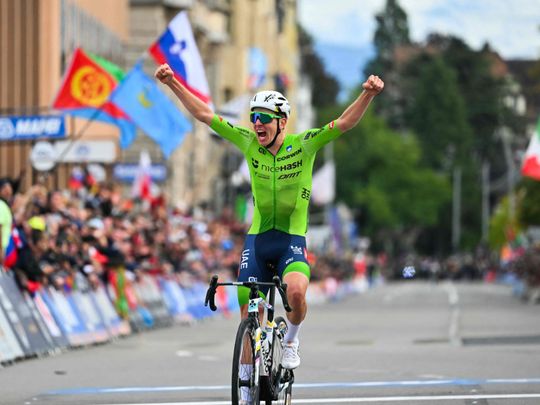
Tadej Pogacar, the Slovenian cycling sensation, has once again etched his name into the annals of cycling history with an audacious performance at the World Championships. His remarkable ability to execute a 100-kilometre solo attack secured him the coveted rainbow jersey and solidified his status as the world’s number-one cyclist. This report explores how Pogacar’s daring tactics outpaced competitors and left fans and analysts in awe while raising questions about the limits of endurance and strategy in professional cycling.
The Build-Up to a Historic Race
As the cycling world gathered for the World Championships, all eyes were on Pogacar. Having already claimed victories in prestigious races like the Giro d’Italia and Tour de France, he entered the event as the overwhelming favourite. The atmosphere was electric, with fans eager to see if he could complete what many called the Triple Crown of cycling.
Pogacar’s reputation for aggressive racing was well-known; however, few could have anticipated the magnitude of his attack during the race. With 101 kilometres remaining, he made a bold move that would ultimately define the event. As he launched himself from the peloton, many questioned whether such an early attack could be sustained over such a long distance.
The 100KM Attack: A Tactical Masterclass
Pogacar’s decision to attack with over 100 kilometres still to ride was both audacious and unprecedented. The move sent shockwaves through the cycling community, prompting immediate reactions from competitors and commentators alike. “It was a stupid move, but it worked,” Pogacar himself admitted after crossing the finish line. His self-deprecating remark highlighted not only his surprise at the success of his strategy but also the inherent risk involved in such a gamble.
The attack began on the Zürichbergstraße during the fourth lap of seven around a challenging circuit. Pogacar initially bridged up to a breakaway group before ultimately going solo with 50 kilometres remaining. His ability to maintain an average speed of 44.3 kph (27.5 mph) over such a gruelling distance is a testament to his exceptional physical conditioning and mental fortitude.
As he pushed forward, Pogacar managed to build a lead that would prove insurmountable for his rivals. Despite appearing fatigued in the final laps, he held off fierce competition from renowned cyclists like Remco Evenepoel and Mathieu van der Poel, who were unable to close the gap.
The Science Behind Pogacar’s Endurance
Pogacar’s performance has sparked discussions about human endurance limits in competitive cycling. Experts analysed his power output during the race, revealing that he averaged around 515 watts—an extraordinary feat for nearly two and a half hours. This level of exertion is typically reserved for shorter bursts in races, making his sustained effort all the more remarkable.
The conditions of the race also played a crucial role in his strategy. The relatively flat terrain allowed him to maintain high speeds without excessive climbing fatigue, while weather conditions remained stable throughout. Moreover, Pogacar’s exceptional bike handling skills allowed him to navigate tight corners efficiently, further enhancing his lead.
Reactions from Rivals and Analysts
Pogacar’s historic victory prompted mixed reactions from fellow competitors and cycling analysts. Many praised his tactical brilliance and sheer determination, while others expressed frustration at their inability to match his pace. “For me, based on this year, Tadej is the deserved world champion,” remarked Van der Poel, acknowledging Pogacar’s dominance throughout the season.
Evenepoel echoed similar sentiments, stating that Pogacar’s performance was “not normal,” highlighting how he consistently seems to operate at a level above his peers. Such comments underscore not only Pogacar’s talent but also raise questions about how future races will unfold as competitors attempt to adapt their strategies against him.
The Aftermath: What Lies Ahead for Pogacar
With this victory, Tadej Pogacar has solidified his position as one of cycling’s all-time greats. His achievement at the World Championships adds another layer to an already illustrious career. However, as he looks ahead, challenges loom on the horizon.
Pogacar must now contend with heightened expectations from fans and sponsors alike. The pressure to replicate such performances will undoubtedly intensify as he prepares for upcoming races like Milan-San Remo and Paris-Roubaix—events that have historically tested even the most seasoned cyclists.
Moreover, teams will likely adjust their strategies specifically aimed at countering Pogacar’s aggressive racing style. As more riders study his tactics and attempt to emulate or counteract them, it will be fascinating to see how this shapes future competition.
A New Era in Cycling
Tadej Pogacar’s audacious 100-kilometre attack at the World Championships has redefined what is possible in professional cycling. His ability to execute such a daring move not only earned him victory but also set new benchmarks for endurance and strategy within the sport.
As discussions about human limits in cycling continue to evolve, one thing remains clear: Tadej Pogacar is not just a rider; he is a phenomenon reshaping our understanding of competitive cycling. With each race, he continues to push boundaries and inspire both fans and fellow athletes alike.
In this new era of cycling dominated by Pogacar’s prowess, competitors will need to adapt quickly or risk being left behind as he carves out his legacy on two wheels. The world will be watching closely as this remarkable athlete continues his journey towards greatness—one bold attack at a time.
Leave a Reply